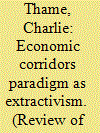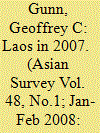| Srl | Item |
| 1 |
ID:
141005


|
|
|
|
|
| Summary/Abstract |
At a meeting of Russia's Security Council in early July President Vladimir Putin spoke about the need to update the National Security Strategy to 2020 taking into account current challenges and risks. He stated that the country's foreign policy would not change and Russia would cooperate with anyone who wanted to cooperate.
|
|
|
|
|
|
|
|
|
|
|
|
|
|
|
|
| 2 |
ID:
180353


|
|
|
|
|
| Summary/Abstract |
Economic corridors are under construction across the planet. Trillions of dollars are being spent and they will have significant implications for international politics and, ultimately, world order. However, there has been limited conceptual work on them to date, especially in International Relations. This article contributes to that gap by explaining the dominant rationale before offering a conceptualisation of economic corridors as an essentially extractivist paradigm. This counter-hegemonic proposition revolves around four relational theses: (1) economic corridors are a ‘fix’ for crises of capitalism; (2) economic corridors exacerbate class struggle; (3) economic corridors are tools for exploitation; (4) economic corridors facilitate financial extraction. In so doing it unmasks the dominant rationale as ideological cover for valorisation and accumulation based on extractive and exploitative relations with human and extra-human nature. Rather than contributing to inclusive and sustainable development as proponents claim, the article contends economic corridors reinforce power asymmetries between states, countries, and classes, thereby extending and entrenching processes of uneven and combined development. The argument is substantiated with empirical reference to mainland Southeast Asia but aims to advance understanding of extractive dynamics integral to the concept of economic corridors and hence operative worldwide.
|
|
|
|
|
|
|
|
|
|
|
|
|
|
|
|
| 3 |
ID:
132570


|
|
|
|
|
| Publication |
2014.
|
| Summary/Abstract |
After decades of isolation, Myanmar is now actively re-engaging with the global economy. For successful re-engagement, Myanmar needs to implement comprehensive economic reforms based on a shared vision of long-term economic development characterized by human-centred, sustainable, pro-poor, inclusive, high and balanced economic growth. In this paper, we propose five growth strategies: an "Agriculture Plus Plus" strategy; an export-oriented strategy; a foreign direct investment driven strategy; a two-polar growth strategy; and a domestic economic corridors development strategy. These strategies are used as guides to translate wide-ranging development agendas into a set of implementable policies, programmes, and projects.
|
|
|
|
|
|
|
|
|
|
|
|
|
|
|
|
| 4 |
ID:
081860


|
|
|
|
|
| Publication |
2008.
|
| Summary/Abstract |
Laos in 2007 unveiled new infrastructure linking the landlocked country with its neighbors. Just as Laos seeks to exploit its ample natural riches, so the country reinvents its sense of regional integration. Willy-nilly, such late-arriving globalization also brings the still largely isolated communist state under increasing international attention on a range of governance and human rights issues
|
|
|
|
|
|
|
|
|
|
|
|
|
|
|
|